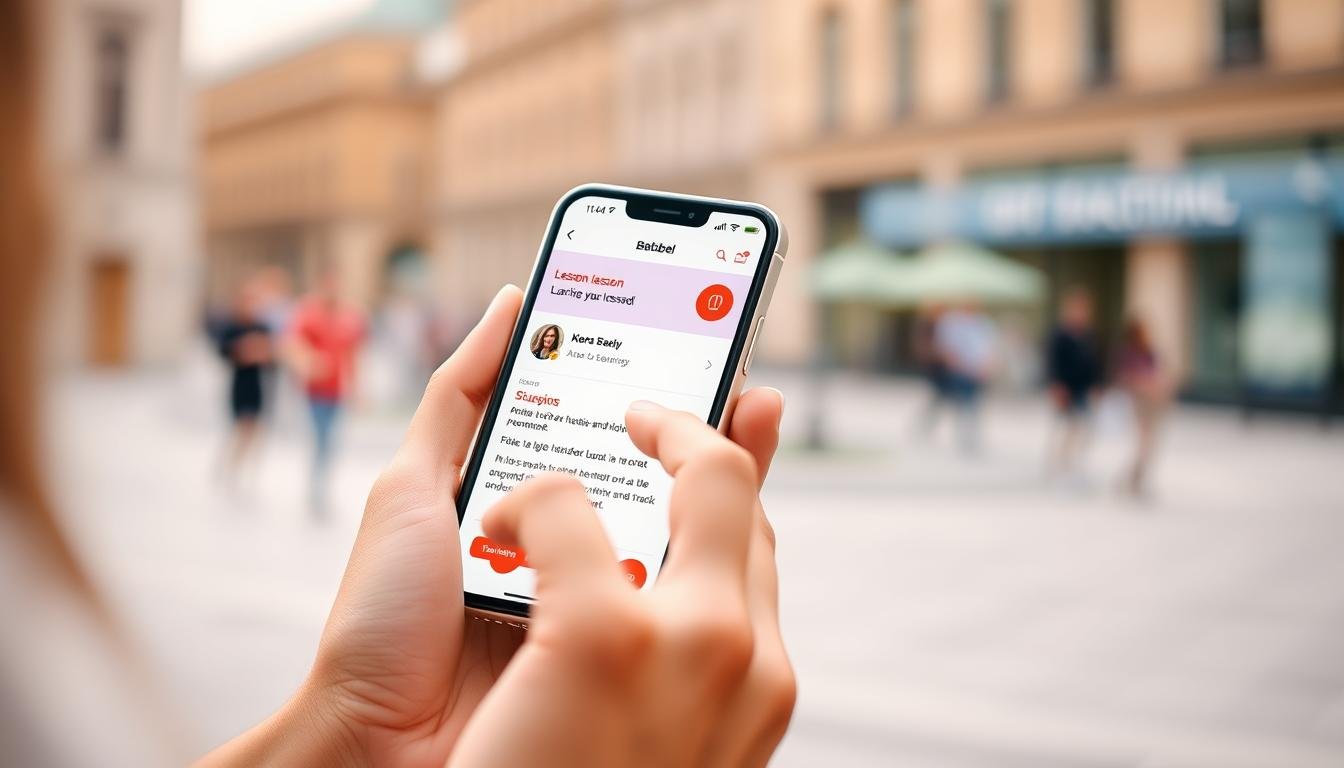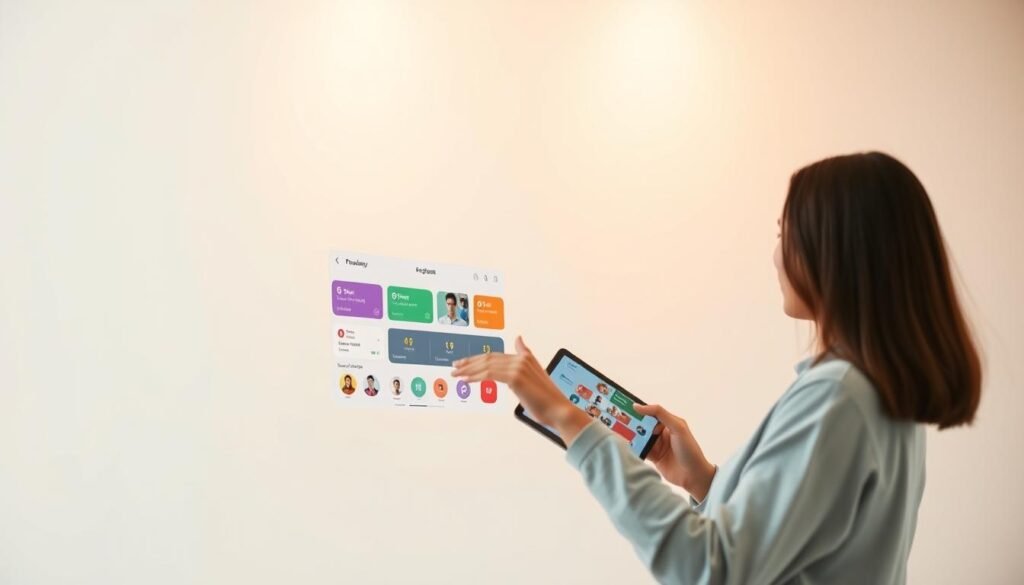What if learning a new language didn’t feel like a chore but an exciting adventure? With Babbel, mastering Spanish, French, or German becomes engaging and effective. This top-tier platform offers structured lessons designed by linguists, ensuring real-world fluency without the boredom.
Starting at just $8.95/month, Babbel makes education affordable. A lifetime subscription is also available for $169.99, perfect for dedicated learners. Whether on iOS, Android, or desktop, the app adapts seamlessly to your lifestyle.
Backed by research from Yale and Michigan State, Babbel’s method works. Over 10 million users and a 4.4-star Trustpilot rating prove its success. Ready to turn language learning into a rewarding habit?
Key Takeaways
- Learn 14 languages, including Spanish, French, and German.
- Affordable plans start at $8.95/month.
- Works on iOS, Android, and desktop.
- Trusted by Yale and Michigan State studies.
- Rated 4.4 stars by over 10 million users.
Introduction to Babbel: A Modern Language-Learning Solution
From Berlin to NYC, a global team redefines how we learn languages. Founded in 2007, this platform launched in 2008 and now employs 1,000 experts. Strategic acquisitions like PlaySay (2013) and Toucan (2023) expanded its conversational tools.
Lessons follow the CEFR framework, covering A1 (beginner) to B2 (upper-intermediate). Instead of memorization, users practice real-world dialogues—ordering coffee or booking hotels. Research shows 92% improve proficiency within two months.
The June 2025 update refined the learning app with smoother navigation and fresh content. It also earned a 2023 Anthem Award for free Ukrainian courses, aiding refugees mastering a new language.
Why Babbel Stands Out Among Language-Learning Apps
The best language apps make learning feel natural—like chatting with a friend. Instead of dull drills, they focus on skills you’ll use daily. Here’s how this platform delivers.
Interactive Lessons with Real-Life Applications
Practice ordering coffee or booking hotels, not memorizing lists. The app uses scenarios like Berlin café dialogues to build confidence. Lessons adapt as you improve, keeping challenges balanced.
Native Speaker Audio for Authentic Pronunciation
Hear words spoken by locals, not robotic voices. Real-time feedback fine-tunes your accent. This turns textbook phrases into natural speech.
AI-Powered Tools for Personalized Learning
An AI features like the 2023 conversation partner mimics real chats. Spaced repetition algorithms schedule reviews at optimal times. Struggling with German verbs? The system adjusts difficulty automatically.
Babbel’s Pricing: Is It Affordable for Learners?
Budget-conscious learners need flexible options when choosing a language app. With subscriptions starting at $8.95/month, the platform offers tiered plans to fit different goals and budgets. A lifetime access option at $169.99 provides long-term value for dedicated students.
Monthly vs. Lifetime Subscription Plans
The monthly plan suits casual learners, while the lifetime deal eliminates recurring fees. Corporate and educational discounts are available, making it easier for teams or classrooms to adopt. Non-profits also qualify for special rates through partnership programs.
Comparing Costs to Competitors
Unlike free apps with ads, this platform focuses on structured lessons. Rosetta Stone costs $11.99/month but lacks Babbel’s conversational tools. For serious learners, the investment delivers clearer ROI through real-world fluency.
Babbel’s Learning Methodologies: What Makes It Effective?
Effective language learning blends structure with practical conversation. Unlike traditional textbooks, this platform focuses on skills you’ll use daily. Here’s how its science-backed strategies build fluency faster.
Real-Life Conversational Topics
Lessons simulate ordering food or asking for directions. You’ll practice dialogues with native speaker audio, not isolated phrases. This builds confidence for real-world interactions.
Spaced Repetition for Long-Term Retention
The app schedules reviews at optimal intervals. This education technique combats forgetting curves. Struggling words reappear, while mastered ones fade—efficient and adaptive.
Grammar and Vocabulary Integration
Bite-sized grammar tips follow exercises, like verb conjugations post-dialogue. Thematic units teach vocabulary in context. Error analysis highlights patterns, turning mistakes into lessons.
User Experience: Navigating the Babbel App
Navigating a language app should feel intuitive, not frustrating. The platform’s clean design and logical flow help users focus on learning, not troubleshooting.
Mobile and Desktop Compatibility
Switch between phone and computer without losing your place. Synced progress ensures lessons pick up where you left off. The responsive layout adapts to any screen size.
Offline Learning Capabilities
Download lessons for flights or commutes. Offline mode covers core exercises, so Wi-Fi gaps won’t interrupt your streak. Reconnect to sync results automatically.
Progress Tracking and Motivational Features
Visual dashboards show completed lessons (21/79) and skill mastery. Weekly emails recap your progress, while badges celebrate milestones like 10-day streaks.
Set a goal—like “converse in Spanish in 3 months”—and the app suggests daily targets. Share certificates on social media or join learner spotlights for extra motivation.
Pros and Cons of Using Babbel
Every language-learning tool has strengths and weaknesses—here’s how this platform stacks up. While its methods excel for beginners, some users might hit roadblocks near the end of their journey.
Advantages: Structured Curriculum and AI Features
The structured curriculum follows CEFR standards, ideal for A1–B2 learners. Lessons build real-world skills, like negotiating prices or reading menus.
AI tools personalize reviews, targeting weak spots. Spaced repetition ensures vocabulary sticks, and the 2023 conversation simulator mimics natural dialogues.
Limitations: No Free Tier and Advanced-Level Gaps
Free trials exist, but no permanent free tier. Competitors like iTalki offer more for advanced speakers, especially in tonal languages like Mandarin.
The platform caps at B2 (upper-intermediate), leaving C1/C2 learners with questions. Academic credits aren’t available, and community features are minimal compared to rivals.
Expert and User Reviews: What Others Say About Babbel
Experts and everyday users share honest opinions on this popular learning platform. While some praise its structured approach, others highlight areas for improvement. Here’s a balanced look at the feedback.
Feedback from Language-Learning Experts
Linguists applaud the app’s CEFR-aligned curriculum, calling it ideal for A1–B2 learners. A Yale study noted 73% of users gained conversational skills within three months. However, experts suggest adding C1/C2 content for advanced students.
Educators highlight the real-world dialogues as a standout feature. Unlike rote memorization, lessons simulate ordering food or navigating airports. This practical focus helps users apply skills immediately.
Real User Testimonials from Trustpilot and Reddit
On Trustpilot, Gunilla praised the app for helping her reopen her Barcelona café: “I mastered Spanish phrases for customer service in weeks.” Over 10,000 similar testimonials cite business success or smoother expat relocations.
Reddit debates are mixed. One user claimed “4 years wasted” due to limited advanced content, while others celebrated reconnecting with heritage languages. Corporate teams also report improved employee performance in multilingual roles.
Key takeaways from user experience:
- Small businesses: Staff learn industry-specific vocabulary fast.
- Expat prep: Lessons on visas and housing ease transitions.
- Heritage learners: Rebuild fluency with cultural context.
Conclusion: Is Babbel Worth It?
Deciding on a language learning app? Here’s what makes this one stand out. After two years, users report faster fluency for travel or work—especially beginners. The subscription pays off if you practice daily, with lifetime access offering the best value.
Pair it with podcasts or tutors for advanced skills. Future updates like VR conversations could elevate immersion. For now, it’s ideal for structured learners aiming for B2 proficiency.
So, is it worth it? Yes, if you want affordable, science-backed lessons. Not if you need C1/C2 content or a free tier. Match your goals to its strengths, and start speaking confidently.
FAQ
How does Babbel compare to other language-learning apps?
Unlike many competitors, Babbel focuses on real-life conversations and practical vocabulary. It also includes grammar lessons, which apps like Duolingo often skip. The structured approach helps learners build usable skills faster.
Can I use Babbel offline?
Yes! The app allows offline access, so you can keep learning without an internet connection. Just download lessons in advance and practice anytime, anywhere.
Is Babbel good for beginners?
Absolutely. The courses start with basics like greetings and common phrases. The interactive lessons and native speaker audio help beginners build confidence in speaking and listening early on.
Does Babbel offer a free trial?
Babbel provides a free first lesson for each language. After that, a subscription is required. There’s no unlimited free tier, but the paid plans offer strong value for structured learning.
How much does Babbel cost?
Prices vary by subscription length. Monthly plans start around , while longer commitments (6 or 12 months) lower the cost. Lifetime access is also available for a one-time payment.
Does Babbel teach advanced language skills?
While great for beginners and intermediates, some users find advanced content limited. It excels in conversational fluency but may not cover specialized or high-level vocabulary.
Can I switch between languages with one subscription?
No, subscriptions are language-specific. You’ll need separate plans for each language, but switching is easy if you want to focus on one at a time.
Does Babbel use AI or voice recognition?
Yes! The app includes speech recognition to fine-tune pronunciation. AI also personalizes review sessions, reinforcing words you struggle with for better retention.







